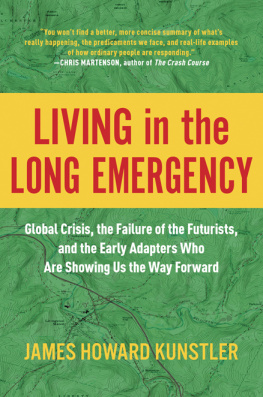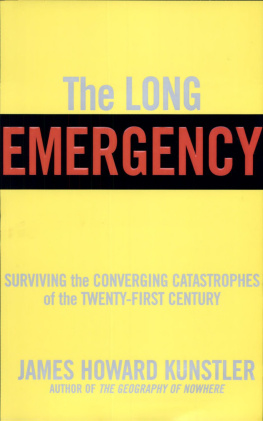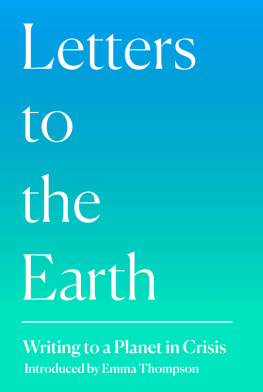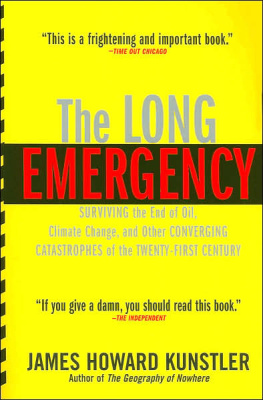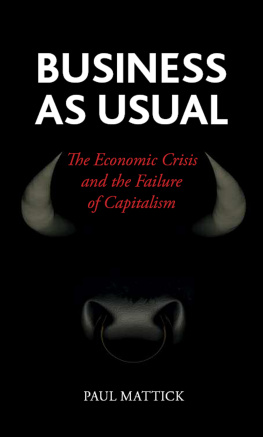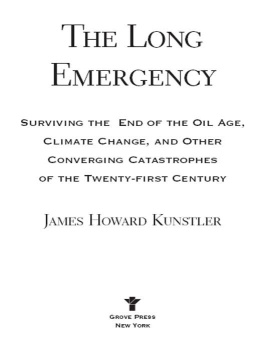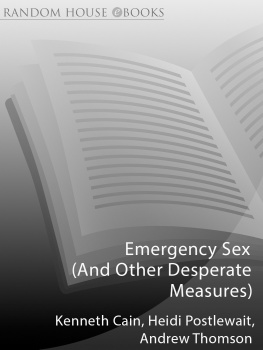Contents
Guide
PRAISE FOR LIVING IN THE LONG EMERGENCY
You wont find a better, more concise summary of whats really happening, the predicaments we face, and real-life examples of how ordinary people are responding. Optimism for the future begins with the awareness that things cannot continue as they have been. This book jumps that hurdle, and explores the past, the present, and the future in a way that is ultimately and surprisingly optimistic.
Chris Martenson, author of The Crash Course and blogger at Peakprosperity.com
Kunstler possesses the alchemy of describing a comprehensive disaster with a light touch. This is that rare, book on the future that is entertaining to the last page. The impression is that, along with the troubles, a more pleasant way to live will gradually emerge.
Andres Duany, author of Suburban Nation

ALSO BY JAMES HOWARD KUNSTLER
Nonfiction
Too Much Magic
The Long Emergency
The City in Mind
Home From Nowhere
The Geography of Nowhere
Fiction
The World Made By Hand Series
The Harrows of Spring
A History of the Future
The Witch of Hebron
World Made By Hand
A Safe and Happy Place
Maggie Darling, a Modern Romance
Thunder Island
The Halloween Ball
The Hunt
Blood Solstice
An Embarrassment of Riches
The Life of Byron Jaynes
A Clown in the Moonlight
The Wampanaki Tales

Living in the Long Emergency copyright 2020 by James Howard Kunstler
All rights reserved. No part of this book may be used or reproduced in any manner whatsoever without written permission of the publisher except in the case of brief quotations embodied in critical articles or reviews.

BenBella Books, Inc.
10440 N. Central Expressway, Suite 800
Dallas, TX 75231
www.benbellabooks.com
Send feedback to
BenBella is a federally registered trademark.
First E-Book Edition: March 2020
Library of Congress Control Number: 2019037850
9781948836937 (trade cloth)
9781950665129 (electronic)
Editing by Alexa Stevenson
Copyediting by Scott Calamar
Proofreading by Sarah Vostok and Amy Zarkos
Indexing by WordCo Indexing Services
Text design and composition by Aaron Edmiston
Cover design by Sarah Avinger
Printed by Lake Book Manufacturing
Map image courtesy of the U.S. Geological Survey (USGS)
Images on by Steve St. Angelo
Distributed to the trade by Two Rivers Distribution, an Ingram brand www.tworiversdistribution.com
Special discounts for bulk sales are available.
Please contact .
This book is for Steve and Joleen Meines.
We spend our lives trying to discern where we end and the rest of the world begins. There is a strange and sorrowful loneliness to this, to being a creature that carries its fragile sense of self in a bag of skin on an endless pilgrimage to some promised land of belonging. We are willing to erect many defenses to hedge against that loneliness and fortress our fragility. But every once in a while, we encounter another such creature who reminds us with the sweetness of persistent yet undemanding affection that we need not walk alone.
Maria Popova
CONTENTS
Back in the year 2005, I published a book called The Long Emergency that made the case for a coming collapse of the industrial economy. Since it predicted the demise of just about everything we consider normal in daily life, it spooked a lot of people. Here we are, fifteen years later. The country has seen the stunning election of our first black president, an epic financial blowup (and a dubious recovery), and the political shock of Donald Trumps 2016 victory. Yet to the casual observer it seems that little has really changed. The Ford F-150 pickup trucks still hurtle proudly around the ever-more-sprawling suburbs; the Too-Big-to-Fail banks still thrive in their artificial interest-rate arbitrage nirvana; the supermarket shelves groan with high-fructose corn syrupbased treats; Disney World rakes in record revenues; American troops still patrol the backcountry in Afghanistan; Silicon Valley keeps minting new billionaires; and, well, the whole wicked, groaning apparatus of modernity appears to carry on as if nothing significant has happened. It kind of reminds me of what Ricky Ricardo used to tell Lucy on TV: You got some splainin to do!
All right, then, I will. For one thing, I didnt call it The Long Emergency for no reason. The operations of complex societies have many interesting features. Two in particular exist in a sort of dynamic tension of opposites: fragility and inertia. Fragility accretes insidiously as ever-greater complexity is layered onto the system. But inertia is the property by which systems in motion tend to remain in motion. A system as large and complex as ours has acquired tremendous momentum, which, of course, feeds back to aggravate its fragility, portending a more destructive eventual outcome. And so it keeps staggering along, despite all the tension and stress, until it reaches criticality... and cracks. And this can go on longer than we might suppose. Herb Stein, the chairman of the Council of Economic Advisers long ago under presidents Nixon and Ford, summed it up nicely in Steins Law: If something cannot go on forever, it will stop.
In the so-called Great Financial Crisis of 2008, when fragility suddenly asserted itself under the weight of unprecedented mortgage fraud, Lehman Brothers collapsed, and a colossal daisy chain of bank counterparty obligations began to unravel, it looked for a while like the proverbial end of the world as we knew it. The cost to arrest this fiasco, including all the bailouts plus lost household wealth, ranged between $17 and $30 trillion, depending on who you ask. There will never be a credible accounting for it, but to paraphrase the late senator Everett Dirksen (R-Ill): a trillion here, a trillion there, sooner or later youre talking about real money.
The whole global system had been affected. In the aftermath, Mario Draghi, chief of the European Central Bank, said he would do whatever it takes to keep the international banking systemand hence the global economychugging on. He was obviously speaking for the whole central banking community. And so, since that time, the central bank financial wizards have executed every stratagem conceivable to maintain the appearance of stability, even while rot and failure spread from the margins to the center of civilized life. In this Potemkin economy, stock markets soared while the middle classes fell into an abyss.
Yogi Berras famous dictum, Its tough to make predictions, especially about the future, beats a path to the Nobel Prizewinning work of psychologists Daniel Kahneman and Amos Tversky in the abstruse field of probability, uncertainty, and decision-making. One of their early experiments in the 1970s led them to conclude that human beings, given a little information, made worse predictions than people who had been given no information at all. Tversky later quipped, The difference between being very smart and very foolish is often very small.
Next page
